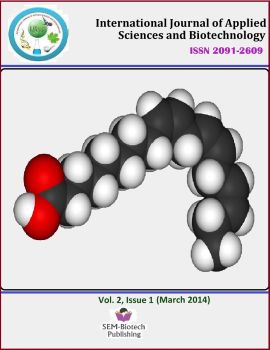Methicillin-Resistant Staphylococcus Aureus (MRSA) in Cattle: Epidemiology and Zoonotic Implications
DOI:
https://doi.org/10.3126/ijasbt.v2i1.9861Keywords:
Cefoxitin, Cattle, MRSA, mecA gene, ZoonosisAbstract
Methicillin-resistant Staphylococcus aureus (MRSA) has emerged as a significant public health problem both in human and veterinary medicine. Strains of S. aureus resistant to β-lactam antibiotics are known as Methicillin-resistant Staphylococcus aureus (MRSA). Overuse of antibiotics has been ascribed for MRSA emergence. MRSA in cattle was first reported in 1975. Since then, many literatures describing MRSA in cattle have been published. MRSA causes incurable intra-mammary infection and skin diseases in cattle. In severe cases, it causes deep-seated infections like endocarditis and osteomyelitis. MRSA got zoonotic importance when scientists suggested the possibility of cattle serving as reservoirs for human MRSA infection. In this article, we review the current knowledge of MRSA in cattle and its zoonotic implications.
DOI: http://dx.doi.org/10.3126/ijasbt.v2i1.9861
Int J Appl Sci Biotechnol, Vol. 2(1): 29-33




